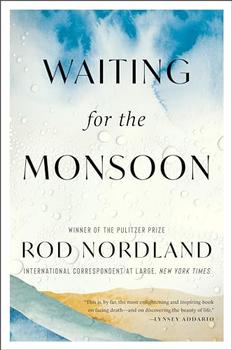Summary | Excerpt | Reviews | Beyond the Book | Read-Alikes | Genres & Themes | Author Bio

This article relates to Waiting for the Monsoon
 Rationally, we all know death is coming, but how many truly believe it? Most people only accept the inevitability when forced to by accident or terminal illness. Ironically, such a diagnosis can lend a new lease on life, as it did for Rod Nordland, author of Waiting for the Monsoon. Rereading E.M. Forster's Howards End recently, I came across the line "Death destroys a man, but the idea of death saves him" – maybe the confirmation of mortality is the spur we need to live courageously and with abandon.
Rationally, we all know death is coming, but how many truly believe it? Most people only accept the inevitability when forced to by accident or terminal illness. Ironically, such a diagnosis can lend a new lease on life, as it did for Rod Nordland, author of Waiting for the Monsoon. Rereading E.M. Forster's Howards End recently, I came across the line "Death destroys a man, but the idea of death saves him" – maybe the confirmation of mortality is the spur we need to live courageously and with abandon.
"Terminal" doesn't always mean death is imminent, after all. Australian author Clive James published 10 books of poetry and essays between a terminal leukemia diagnosis and his death, while poet Christian Wiman has produced six books in the nearly 20 years he's lived with incurable lymphoma. Below I feature four poignant memoirs written with the knowledge of death … sooner or later.
Everything Happens for a Reason: And Other Lies I've Loved by Kate Bowler (2018) – Bowler, an associate professor at Duke Divinity School, received a diagnosis of stage IV colon cancer at age 35, when she was a new mother. Ironically, her specialist research subject is the prosperity gospel – a niche belief among some evangelical Christians that God rewards faithfulness with health and wealth. "In a spiritual world in which healing is a divine right, illness is a symptom of unconfessed sin," one would have to assume by that philosophy. So what had she done wrong? Bowler concludes that there is no link; it's all down to luck. Suffering is a common human experience. All we can do is live in the moment. This was the first of six books she has written since her diagnosis. She also hosts the podcast Everything Happens.
We Know How This Ends: Living while Dying by Bruce H. Kramer with Cathy Wurzer (2015) – Kramer, then a college dean in Minnesota, was forced into early retirement by ALS. He had a realistic perspective on a life of increasing disability: "Above all, I know I cannot fix this. That would only be childish. All I can hope is to work at it, and perhaps some way forward will emerge." Despite his condition, he managed to go skydiving and meet the Dalai Lama. He acknowledges people's different approaches to terminal illness, with some becoming obsessed with bucket lists and others considering assisted dying. Co-author Wurzer, a Minnesota public radio broadcaster, writes about her father's time with Alzheimer's disease and his death from cancer. Kramer died not long after this was published.
And Finally: Matters of Life and Death by Henry Marsh (2023) – Approaching age 70, Marsh, a retired neurosurgeon, learned that he had advanced prostate cancer. He also happened to see a scan of his brain and was aghast at the age-related deterioration he observed. During pandemic lockdowns, he began clearing and renovating his house, and spent time telling stories to his granddaughters over Zoom. He charts his cancer treatment but also looks back on his travels in Nepal and Ukraine – where he has undertaken medical missions for the past three decades. More so than in his previous books, in which he expresses regret over mistakes and cases that went awry during his career, he thinks broadly about the mysteries of the human brain: dreams, delusions, and consciousness itself.
Dying: A Memoir by Cory Taylor (2016) – Taylor, an Australian novelist who spent significant time in Japan, was diagnosed with stage IV melanoma in 2005 – a result, she was sure, of all the sunbathing she did as a child. When the cancer metastasized, she had brain surgery, but knew it would only give a brief reprieve. In this short book, which was shortlisted for the Stella Prize (for writing by Australian women), she reminisces about her upbringing and details the encounters she had as she tried to embrace mortality, including with Buddhist nuns, a psychiatrist, and a volunteer who came to her home to record her biography. She writes, "life is … simultaneous, all of our experiences existing in time together… I am a girl and I am a dying woman." She died in 2016, shortly after the book was published.
Filed under Reading Lists
![]() This "beyond the book article" relates to Waiting for the Monsoon. It originally ran in March 2024 and has been updated for the
March 2025 paperback edition.
Go to magazine.
This "beyond the book article" relates to Waiting for the Monsoon. It originally ran in March 2024 and has been updated for the
March 2025 paperback edition.
Go to magazine.
A few books well chosen, and well made use of, will be more profitable than a great confused Alexandrian library.
Click Here to find out who said this, as well as discovering other famous literary quotes!
Your guide toexceptional books
BookBrowse seeks out and recommends the best in contemporary fiction and nonfiction—books that not only engage and entertain but also deepen our understanding of ourselves and the world around us.